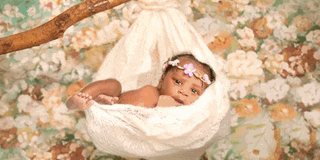There are many ways a child can be given a name

Traditionally, the Luo named a child after the circumstance of its birth. PHOTO | LOLITA KOZYREVA
What you need to know:
- Nevertheless, the Luo never had the family name institution. Everybody knew everybody else by a specific personal tag.
- But since colonialism, kasumba (inferiority complex) has driven many families to copy Europe by imposing the father’s name as the family’s collective last name.
Because the Luo and the Luhya are so profusely intermarried, the male in-laws traditionally tease one another by terms that Dar es Salaam’s Waswahili call utani.
As they say in Kiswahili, wanataniana. However, I doubt if my father’s name Otani comes from the same etymological root.
For, though they are now fully Luo, the Waware of Lake Victoria’s Rusinga Island — my father’s ethnic taproot — were an offshoot of the Baganda, the Bantu community whose name would cause Britain’s colonising forces to slap the label “Uganda” upon the country to Kenya’s north-west.
I don’t know either whether my father’s name Otani has the same etymology as the Kiswahili noun utani and verb kutaniana.
But the initial “O” makes the name Otani typically Nilotic and Luo.
The personal names of male Nilotes tend to begin with an “O” and those of females with an “A” — in the same way that, among the Mediterranean Europeans, the ultimate letter O often denotes maleness and A femaleness.
But I don’t know the circumstance in which the influence occurred.
The one indicator is that, among the Nilotes — just as among the coeval Latins — including the French, Italians, Portuguese, Rumanians and Spaniards — the ultimate sound “O” is sequestered to masculine nouns and “A” to feminine ones.
Moreover, every Luo child has its own last name.
Even in Europe, only the Church’s extreme male bigotry has imposed the paternal family naming dominance.
Nevertheless, the Luo never had the family name institution. Everybody knew everybody else by a specific personal tag.
Everybody knew me as Ochieng’ wuod (“son of”) Otani or Ochieng mak’Otani (“of Otani”).
That is how everybody remembers me around my native Manyata.
NAMING SYSTEM
But since colonialism, kasumba (inferiority complex) has driven many families to copy Europe by imposing the father’s name as the family’s collective last name.
By thus “familiarising” the father’s name, they have made it the family’s property focus.
Traditionally, however, the Luo named a child after the circumstance of its birth, I being called Ochieng only because I was born around noon, “under the sun” (chieng). If a girl, I would now be Achieng.
I am not known as Otani either because, the Luo did not practise the family name system.
Every individual had his or her own last name, which usually depended wholly on the circumstances of one’s birth.
Ochieng wuod Otani can be expressed as Ochieng mak’Otani or simply Ochieng k’Otani.
In the last case, the vowel is elided because the next word begins with a vowel, in the same way that the writer of Song of Lawino is Okot p’Bitek (“Okot of Bitek”), namely, by dropping the “a” from the Acholi-Luo genitive pa (“of”).
The Acholi of Uganda are very close blood, linguistic and cultural relatives of the Luo of Kenya, Congo, Ethiopia, Eritrea and Tanzania.
The Acholi name their children according to the circumstances of the individual’s birth, such as time of the day and weather conditions, which is why I am Ochieng, a “male product of the sun’s sheen”.





